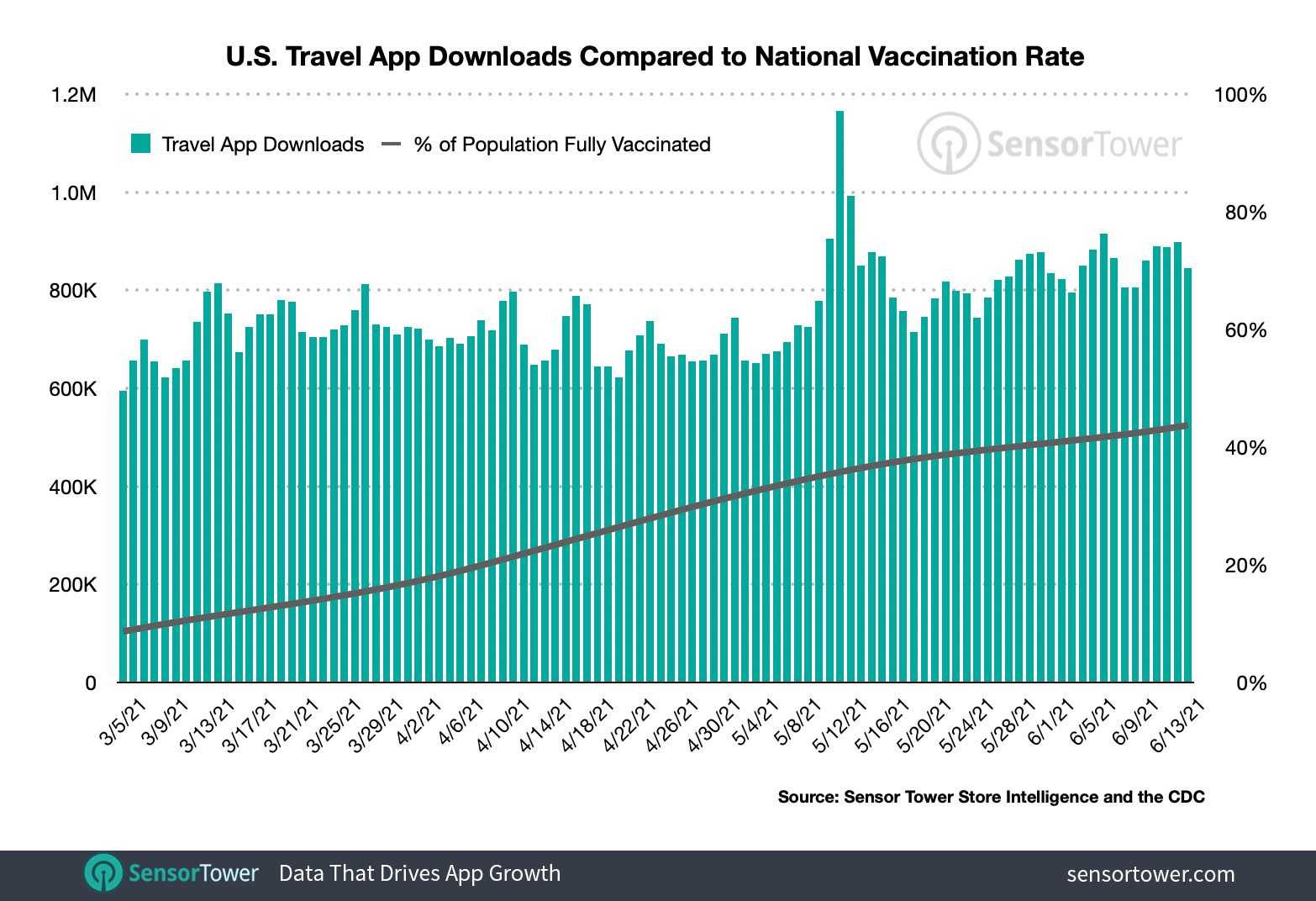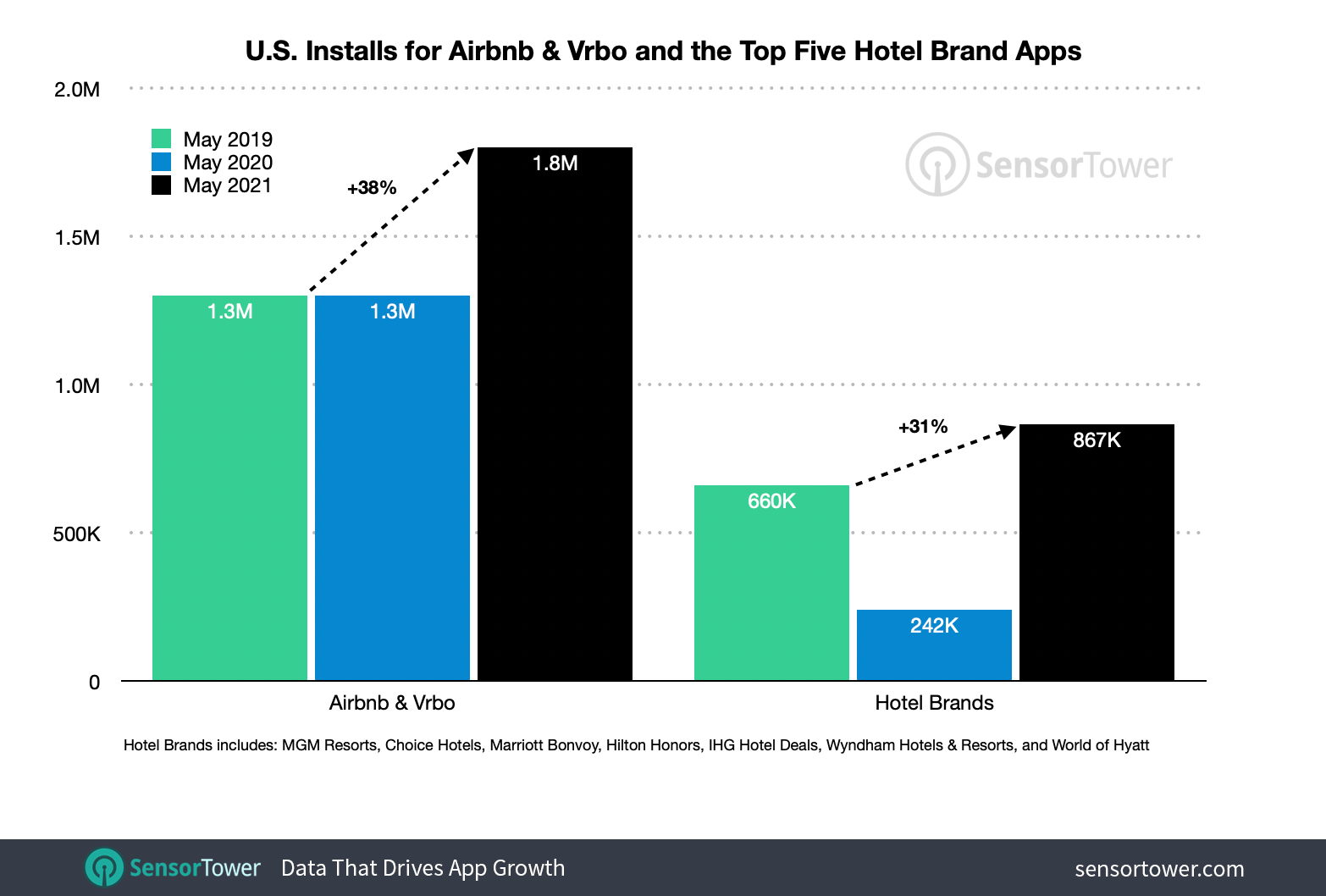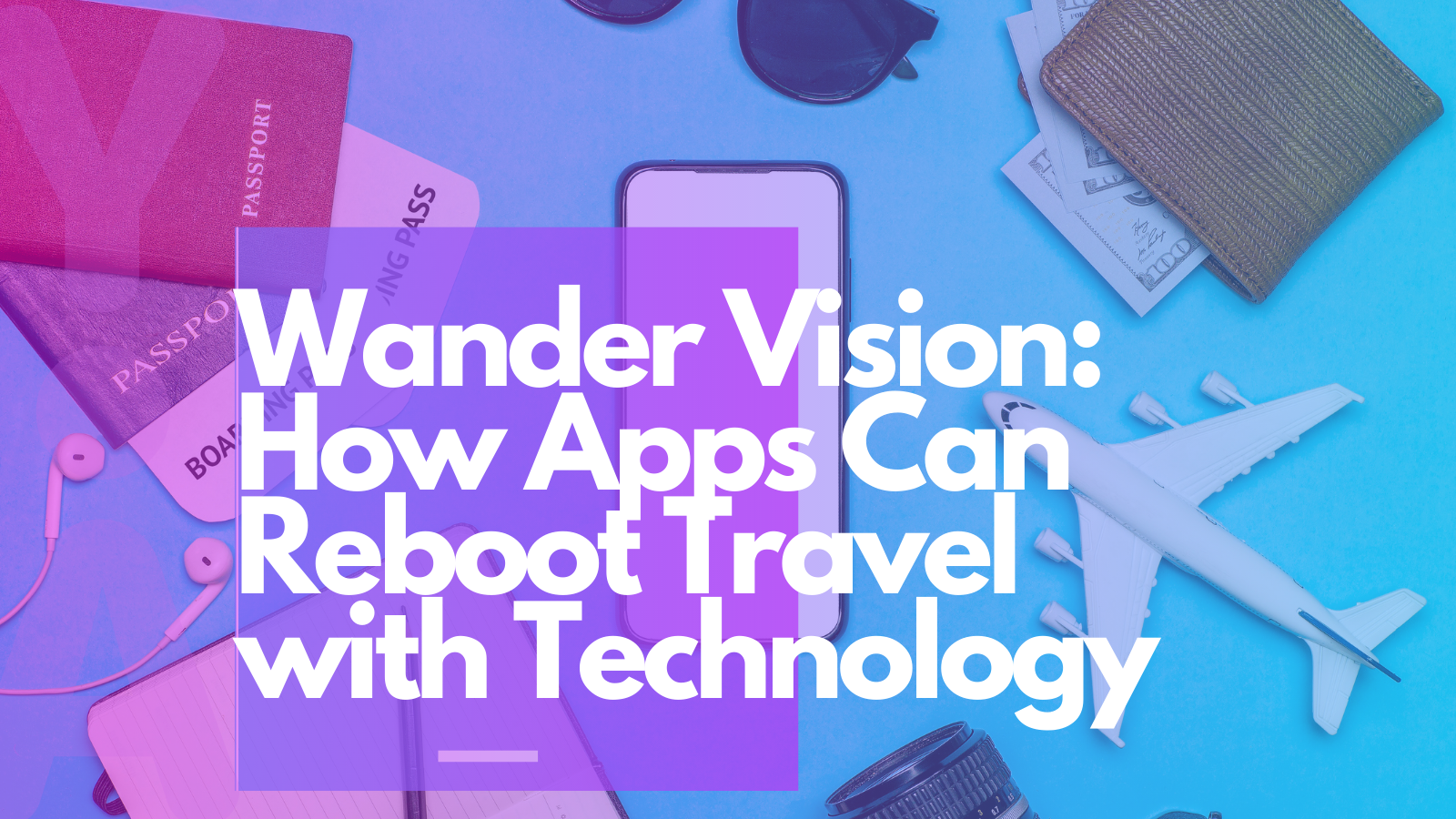Summer is here and recreational travel is on the rise. In fact, July is known to be the busiest month for travel based on app sessions. In other words, more users spend more time on airline apps in July than any other month. How can mobile travel apps capitalize on travel’s reemergence as we transition to a post-COVID era of travel?
The 2021 Travel App Reboot
If spring break was any indication, summer travel in the U.S. is poised to make a comeback.
In May 2021, travel app installs increased by 123%. to 24.7 million. This represented approximately double the amount of travel app installs in 2020.
Airlines saw the most notable growth. Leading airline apps - American Airlines, Delta, Southwest, United and Spirit - climbed to 2.6 million installs in May 2021. This represents a 311% increase from May 2020.

Source: Sensor Tower
Booking apps also saw a spike. Expedia and Hotels.com both saw U.S. installs grow 300% in May year-to-date.
Finally, vacation rental apps like Airbnb, VRBO and major hotel brands saw a 30%+ increase in adoption in May 2021.

Source: Sensor Tower
Along with rising flight and vacation rental bookings, investor interest in travel and tourism companies is also rebounding. Companies in the travel and tourism space have raised $3.4 billion in 2021 to date. This includes airline pricing app, Hopper, with a $170 million funding round in March. Business travel booking app, TravelPerk, also raised a $160 million round in April.
Don’t Call it a Comeback
But is it a comeback? With COVID19 mutations and uneven nationwide vaccine adoption, travel’s resurgence could be a blip. The travel app category is also still very much in recovery, with predicted H1 2021 installs amounting to just 86% of total installs in 2019.
In yet another period of uncertainty, what valuable product developments can travel apps undertake in the transition to a post-COVID era of travel?
Rebooting Travel With Technology
With the COVID-19 pandemic, virus-related news and updates bombard travelers constantly. Travel restrictions for different states and countries can change overnight. Apps that help travelers stay organized as the virus develops are positioned to win in the post-COVID age of travel.
Travel technology provider, Amadeus, reported in their 2021 Rebuild Travel Digital Health Survey that 91% of travelers would feel more confident traveling in the next 12 months with the use of key technologies. Michael Bayle, VP of Retail Customer & Traveler Solutions at Amadeus, specified that “nearly half of travelers [believed] a travel app that could be used across the whole journey would greatly improve their overall travel experience and reassure them their information [was] all in one place.”
On-Trip Notifications
One technology cited to increase user confidence in travel were mobile apps that provide on-trip notifications and alerts. These alerts could notify users of new COVID-19 outbreaks, changes in government guidance or restrictions. According to Amadeus’ study, 42% of users would be more likely to travel if an app provided them this functionality.
Bayle recommends travel apps “integrate real-time, personalized COVID-19 information into their apps and other channels in order to keep their travelers up to date.” An example of this is CheckMyTrip, an app that provides personalized and relevant COVID-19 updates on the go.
Contactless Mobile Payments
Another type of technology noted by users was the ability to make contactless mobile payments for travel-related items. Forty-four percent of users reported that they would be more confident traveling if apps had the functionality of Apple or Google Pay, Venmo or PayPal to help them pay for items digitally. Delta is currently adding contactless payment solutions to their app for onboard purchases. Customers will be able to purchase earbuds on board using their mobile devices or contactless-enabled credit cards. Eventually, touchless payment will also expand to onboard sales of food and beverage options as inflight service returns.
Mobile Boarding Passes
Another functionality cited by users was the ability to store boarding passes on their phone. While an example of this functionality is already available via Apple’s mobile wallet, airline and travel apps that provide this functionality across iOS and Android would capitalize on this demand.
Mobile Health Data
A final technology cited by users is the ability to consolidate the various health records required for their travels. With the constant barrage of COVID-19 related information and news, it’s not easy for travelers to keep track of the testing and vaccine requirements for their travels in real time.
Over two thirds (68%) of travelers would share health data with frequently used airline apps if health data storage functionality was offered. Additionally, over 60% of travelers said they would be open to downloading a third-party app to store their health data.
Bayle recommends travel companies that require verification of COVID-19 PCR test and vaccination implement a Traveler ID element into their apps that would consolidate “various digital proof providers allowing travelers to digitally store and use their COVID-19 related information when traveling.”
One example is the United Airlines app’s recently-launched Travel-Ready Center where customers can review COVID-19 entry requirements, find local testing options and upload any required testing and vaccination records for domestic and international travel. Their mobile app helpfully consolidates this multitude of documentation all in one place.
American Airlines has also built out a mobile health passport with their VeriFLY app. Passengers traveling internationally can use this health passport app to upload required test results, review travel requirements to their destination and verify their travel requirements before boarding.
The trend of providing mobile health data storage is also catching on with other airline apps. According to Bayle, “Many carriers worldwide are trialing various vaccination passport type applications with their travelers.”
The Future of Travel Technology is Bright
It would be an understatement to say that the travel industry experienced challenging headwinds in 2020. Interestingly enough, it seems those headwinds will be the same forces that propel the travel sector into a golden age of innovation as travel technology providers rise to fill the gaps revealed by the COVID-19 pandemic. By providing on-trip notifications, touchless mobile payment and boarding pass options and the ability to store mobile health data, travel providers have an opportunity to provide a safer, more seamless experience for their customers. The integration of this technology into apps is critical to meet the demand of a changing global landscape and the travelers who traverse it.

